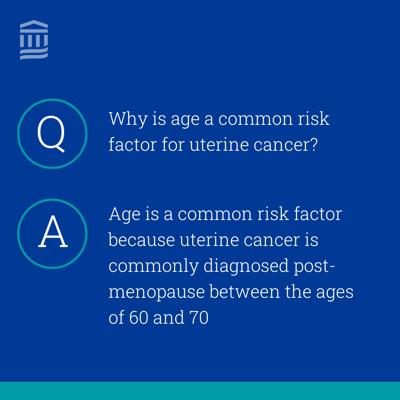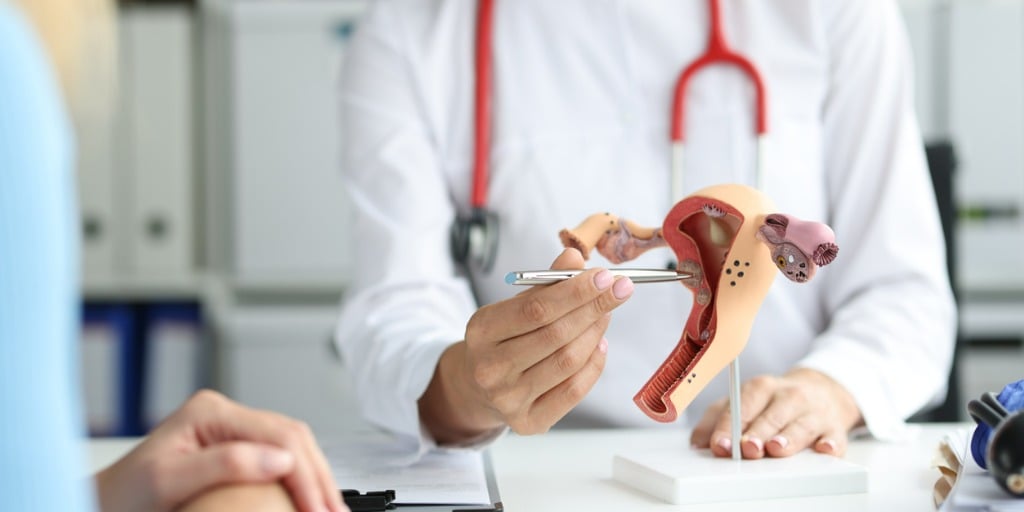Uterine cancer risk factors and when to see a gynecologist
Did you know the fourth most common cancer for women and the most common gynecologic cancer in the United States is uterine cancer? It can involve two types of issues: Endometrial cancer, which happens the most, and uterine sarcoma, considered much rarer. Both affect the uterus, putting anyone with a uterus at risk.
In recognition of Gynecologic Cancer Awareness Month, here are some top questions about uterine cancer, along with the facts most important to know.

What are the risk factors for developing uterine cancer?
One of the major risk factors for this type of cancer is age since it usually occurs after menopause. Although uterine cancer is typically diagnosed between the ages of 60 and 70, it may also occur when menopause begins.
Despite being fairly rare in younger women, prevalence is still estimated at 5 percent, which means it's important for all women to recognize the signs of this cancer.
Other risk factors include:
- Having obesity as well as related conditions like diabetes or high blood pressure
- Taking estrogen by itself (without progesterone) for hormone replacement during menopause
- Having fewer than five periods in a year before starting menopause
- Never being pregnant or having trouble getting pregnant in the past
- Starting menopause after age 50
- Having close family members who have had uterine, colon, or ovarian cancer
- History of endometrial polyps or other benign growths of the uterine lining
- Starting menstruation before age 12
- Taking tamoxifen to reduce the risk of developing breast cancer or a breast cancer recurrence
- Having radiation therapy for another cancer in the pelvic area
There's evidence that the length of time exposed to estrogen is another major factor. For example, if a woman begins menstruation at a younger-than-usual age, doesn't have children, and enters menopause later in her 50s, she would have a longer lifetime of estrogen exposure.
Keep in mind that even if several of these risks are true for you, it doesn't mean uterine cancer is inevitable. However, it may mean talking to your doctor about more frequent exams.
What are the symptoms of uterine cancer, and when should you see your gynecologist?
.png?width=400&height=400&name=LIZ-Posts%20wrapped%20in%20blog%20II%20(13).png)
Right now, there is no simple or reliable way to screen for uterine cancer, unlike other types of cancer screening such as mammograms for breast cancer or pap smears for cervical cancer.
Because of that, it's particularly important to recognize symptoms and make an appointment with your gynecologist as early as possible. Check in with your doctor if you're seeing warning signs like these:
- Unusual vaginal bleeding or discharge not related to menstruation, and especially if you're postmenopausal
- Painful or difficult urination
- Pelvic pain or pressure
- Heavy or frequent episodes of vaginal bleeding after age 40
- Pain during sex
At the gynecologist appointment, the doctor will take a health history, assess risk factors, ask about family health history, and may perform an exam such as a pap test, pelvic exam, or transvaginal ultrasound. If cancer is suspected, a sample of tissue will be taken from the uterine lining as a biopsy.
How is uterine cancer treated?
.png?width=350&height=350&name=LIZ-Posts%20wrapped%20in%20blog%20II%20(14).png) Endometrial cancer is considered highly treatable. The National Cancer Institute notes that its five-year survival rate is 81 percent. For comparison, the survival rate for ovarian cancer five years after diagnosis is 46 percent, and for pancreatic cancer, that rate is 11 percent.
Endometrial cancer is considered highly treatable. The National Cancer Institute notes that its five-year survival rate is 81 percent. For comparison, the survival rate for ovarian cancer five years after diagnosis is 46 percent, and for pancreatic cancer, that rate is 11 percent.
Treatment will depend on the extent of the cancer, and may include a hysterectomy to remove the uterus and cervix, radiation therapy, chemotherapy, immunotherapy, targeted therapy, or a combination of these.
How can you reduce your risk?
Even if you're younger and don't have any other risk factors, it's helpful to keep uterine cancer in mind as you're aging. That's because some strategies done when you're younger could have an effect on your risk level. The CDC recommends:
- Using birth control pills
- Maintaining a healthy weight
- Staying physically active
- Taking progesterone if you're using estrogen for menopause symptoms
- Control diabetes if you have it by regularly monitoring blood sugar levels
If you're about to enter menopause, be sure to talk with your doctor about risks, so you can create a plan together to keep you healthy as you age.
For more health and wellness education from Mass General Brigham Health Plan, follow us on social @MGBHealthPlan
⬇️




